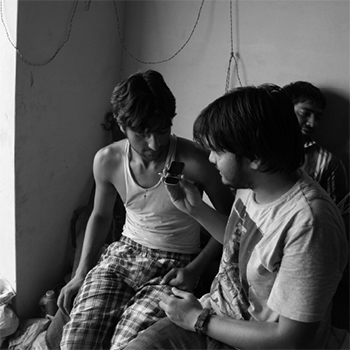Efficient physical devices, specially designed for one -handed text input in Devanagari aren’t available. This projects aims at designing an efficient one -handed text input method for Devanagari such that it facilitates the typing process with just one hand. The project contributes new methods to input Devanagari text, based on the structure of the script. The designs underwent through cycles of design, prototyping and evaluation. The final prototyped and evaluated concept called 'Melo' is inspired from ‘melodica’ – a type of musical keyboard. In Melo, characters are entered through simultaneous multiple key presses, using key combinations that follow a pattern based on the structure of the script. Two types of evaluations were conducted on the design - One was Theoretical evaluation, in which overall effort was measured and compared with InScript and Half -qwerty keyboard (both were used for one -handed input in Devanagari) for 3 set of words with different level of complexity; and other was Empirical evaluation, in which a short term test and long term test were conducted for the final design and InScript Keyboard (for one -handed use). The objective was to compare learnability, typing speed and accuracy for the two keyboards. Melo keyboard was found intuitive and easy to learn by first -time users. The finger travel and no. of key presses on Melo were similar to Half - qwerty, Inscript had least no. of key presses and maximum finger travel. But, the finger gestures while typing on Melo were user -friendlier and the finger load was distributed primarily on the fingers with higher strength and pointing accuracy as compared to the other two. Based on the data from Long term Study, Melo was doing better than InScript but, the difference were not significant enough to draw conclusions about the typing speed and accuracy



